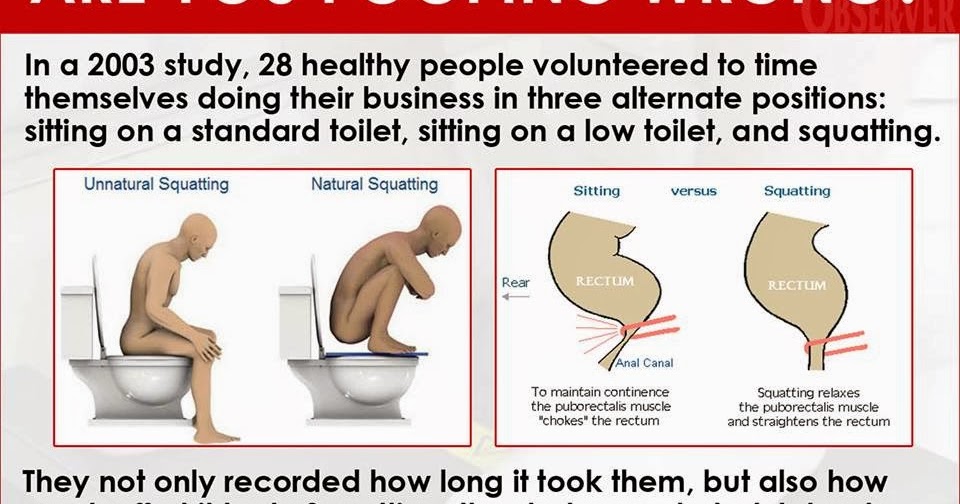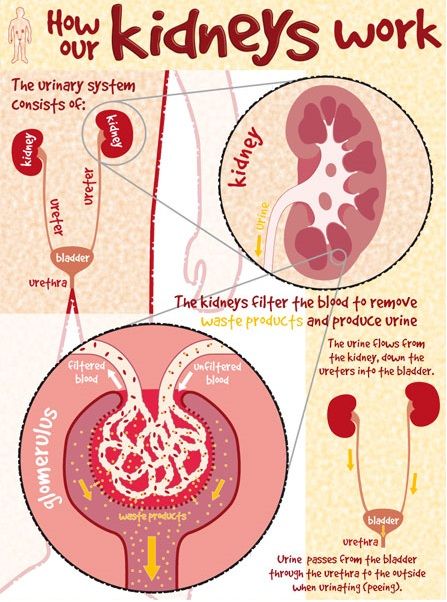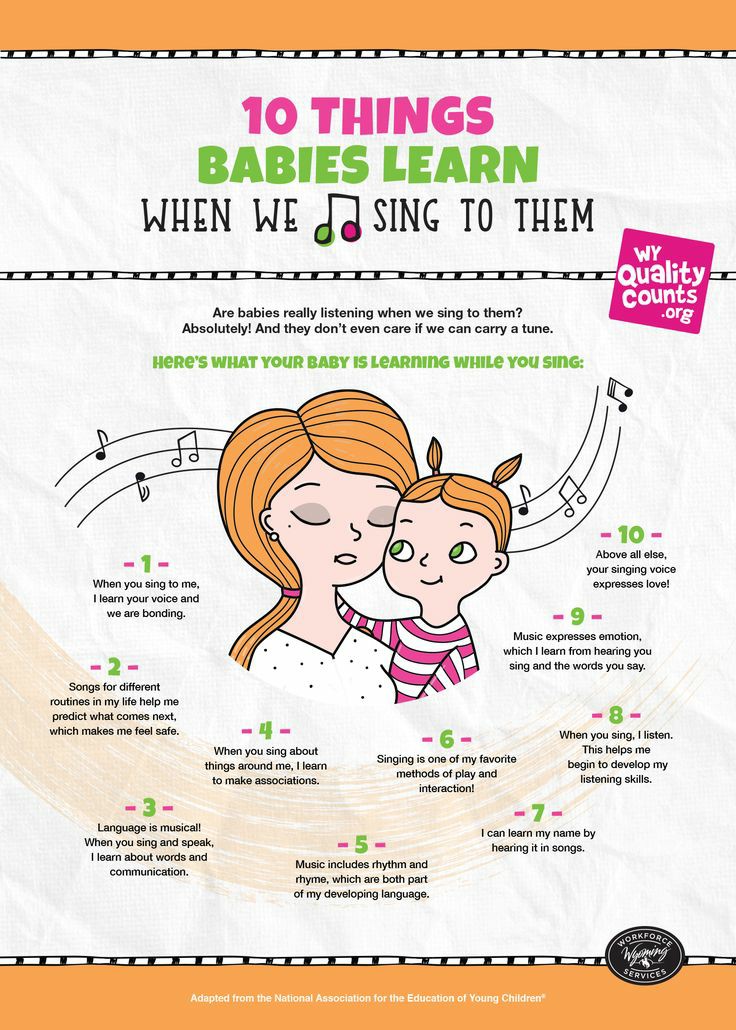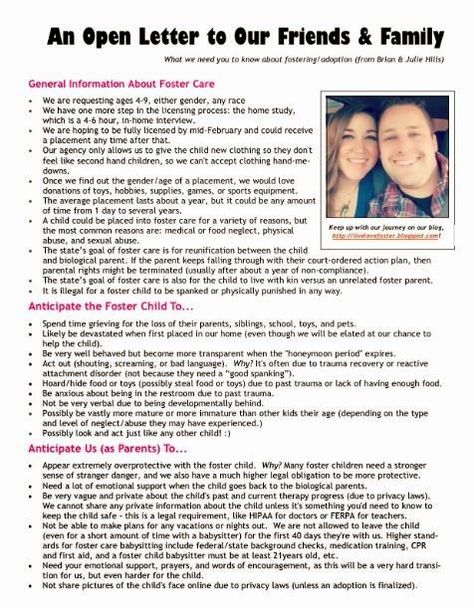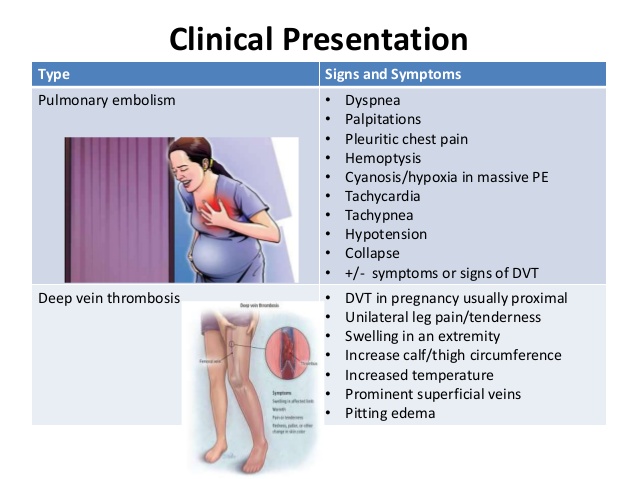Is constant pooping a sign of pregnancy
Is Pooping A Lot A Sign Of Pregnancy?
You've heard all about morning sickness and tender boobs as early signs of pregnancy, but what about your uh...bathroom habits? Whether you’re newly pregnant or wondering if you could be, there are some digestive changes that come along with pregnancy that you should know about, particularly if you're suddenly running to the toilet for number twos all the time. (Not fun!)
Sooo...is pooping a lot one of the signs of early pregnancy?Actually, this is a bit of a myth, says Temeka Zore, MD, a board-certified ob-gyn and reproductive endocrinologist at Spring Fertility. Pooping a lot isn't linked to the beginning of most pregnancies. In fact, constipation is more likely.
Hormonal changes, particularly during the menstrual cycle, can have an affect on bowels, especially for people with IBS, research has found. But without a regular cycle during pregnancy, you may not notice the same digestive patterns (a. k.a. period poops) that you might have during menstruation. (Still, that's not to say *no one* experiences an increase in poops during early pregnancy, it's just not super common.)
During the early stages of pregnancy, the first thing you’ll probably notice is your period dropping off. Then, it’s common to experience nausea or vomiting, breast tenderness, fatigue, and increased urination, says Dr. Zore. Bloating and cramping, particularly of the uterus, are also some things you should be prepared for. It’s important to note that most of these unpleasant symptoms won’t last for too long in your pregnancy (thankfully!).
What if I *am* pregnant and pooping more frequently—normal?If your stomach issues go beyond occasional cramping, bloating, and fullness—these are signs that the uterus is expanding and compressing your bowels, says Dr. Zore—there might be something else going on. Of course, if you’re already aware that you have a form of inflammatory bowel disease, just note that the symptoms may flare up during pregnancy, according to a study published in Gastroenterology and Hematology.
Related Story
- 7 IBS Symptoms Every Woman Should Know About
If you’ve never been diagnosed with any gastroenterological conditions and are experiencing frequent bouts of diarrhea throughout your pregnancy, for example, this is worth getting checked out, since it could be a sign of a more serious inflammatory bowel condition, like ulcerative colitis or Crohn’s disease. "These include multiple episodes of diarrhea per day, bloody stools, fever, and abdominal pain,” Dr. Zore explains. It’s important to pay attention to any of these symptoms, whether they’re mild, moderate, or severe, she says.
What can you do if you have pregnancy diarrhea?Again, diarrhea throughout pregnancy is actually less typical than constipation, but if you do experience it, it's more likely to happen closer to the time of delivery. “At that time, your uterus starts producing hormones known as prostaglandins, which help soften the cervix and prepare the uterus to contract in labor,” explains Dr.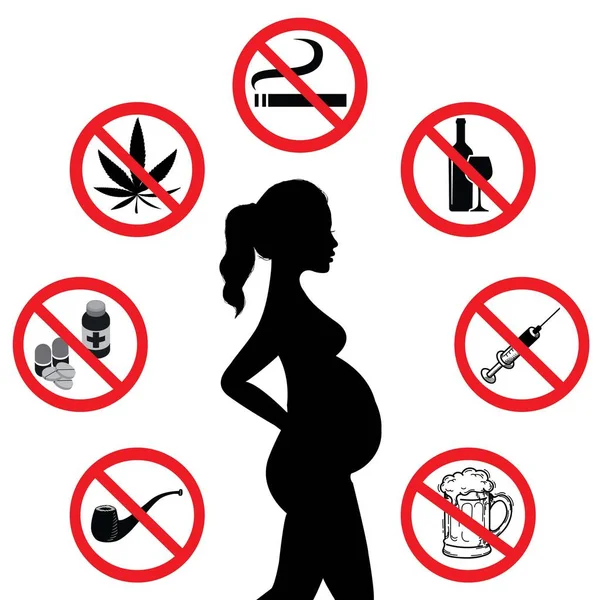 Zore.
Zore.
The prostaglandins also get the smooth muscles of the digestive tract moving, so stool will pass more quickly, Dr. Zore says. You may just experience increased frequency or urgency to go to the bathroom, or you may even get diarrhea in some cases.
If you do have diarrhea, hydration is super important. Basically, loading up on water is your best defense mechanism. Eating a diet rich in fiber while pregnant is also key to make sure you don’t end up with loose stools, says Dr. Zore.
What other poop changes can happen during pregnancy?You’re likely to have constipation at any point of your pregnancy due to the hormonal changes going on. “The elevated progesterone levels in pregnancy lead to smooth muscle relaxation in the uterus (to prevent uterine contractions early on) but can also lead to the relaxation of the smooth muscle in the colon, leading to reduced bowel activity and constipation,” says Dr. Zore.
Zore.
Related Story
- 12 Foods to Eat When You’re Constipated
The other unpleasant symptom you may experience during pregnancy is hemorrhoids, which can affect 30 to 40 percent of people during pregnancy and the postpartum stage, according to Dr. Zore. They can make constipation worse, first of all, but can also cause pain and even bleeding. This makes your hydration and high-fiber diet even more of a priority, Dr. Zore says.
If you’re experiencing persistent bleeding or bloody stools, that is a red flag of a potentially more serious condition.
When should you see a doctor?Any time you notice blood in your stools while pregnant, contact your ob-gyn to check in on what could be wrong, Dr. Zore says. If you have persistent diarrhea that’s causing you to lose weight during pregnancy or is accompanied by a fever greater than 100.4 degrees, alert your doc, she adds.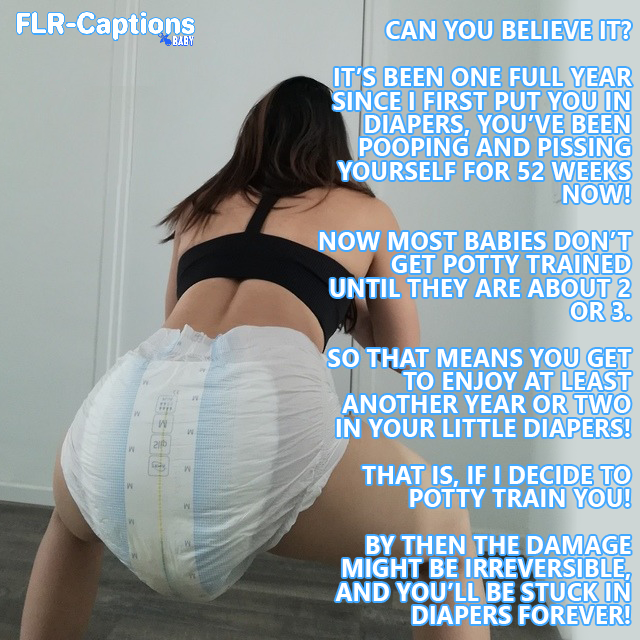 And, if you find yourself not making it to the bathroom, or having extreme stomach pains or cramping, you should bring these symptoms up to your gyno, too.
And, if you find yourself not making it to the bathroom, or having extreme stomach pains or cramping, you should bring these symptoms up to your gyno, too.
In some cases, it might benefit you to see a G.I. doctor as well as your ob-gyn. “If you have a known history of inflammatory bowel disease and notice you are having a flare of your symptoms, you should contact your ob-gyn as well as your gastroenterologist,” says Dr. Zore. Or, if your pregnancy is causing stomach issues beyond the scope of what seems normal, it wouldn’t hurt to have a check up with a gastroenterologist to make sure your digestion is healthy.
The bottom line: Pooping more and having diarrhea usually isn't an early sign of pregnancy. Most pregnant women deal with constipation. If you are having diarrhea, check in with your ob-gyn.
Mara Santilli
Mara is a freelance writer and editor specializing in culture, politics, wellness, and the intersection between them, whose print and digital work has appeared in Marie Claire, Women’s Health, Cosmopolitan, Airbnb Mag, Prevention, and more.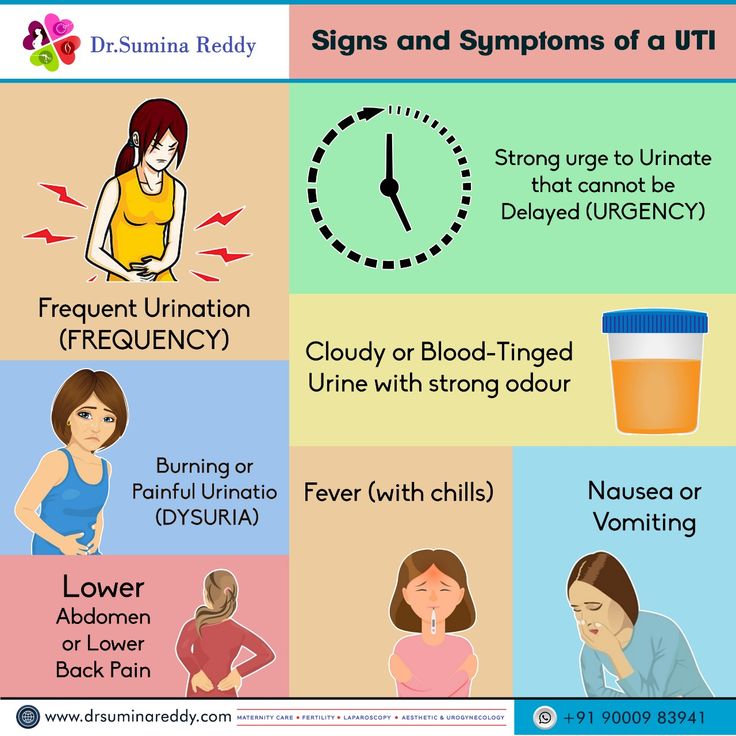 She’s a Fordham University graduate who also has a degree in Italian Studies, so naturally she’s always daydreaming about focaccia.
She’s a Fordham University graduate who also has a degree in Italian Studies, so naturally she’s always daydreaming about focaccia.
Is Pooping a Lot a Sign of Pregnancy?
If you’re anxiously waiting till it’s time to take the all-important pregnancy test, it can be tempting to think that any strange feeling or bodily function is a sign of pregnancy.
Early pregnancy poop is a big conversation, so let’s take a look at all things bowel movements and answer the big question – is pooping a lot a sign of pregnancy?
In this article 📝
- So, is pooping a lot a sign of early pregnancy?
- What are the signs of pregnancy in the first week?
- Why am I pooping more than usual?
- Why do you poop a lot in early pregnancy?
- Is it normal to poop a lot while pregnant?
- Is pooping a lot a sign of period?
So, is pooping a lot a sign of early pregnancy?
Nope. Despite it being a common talking point, it’s not true that frequent bathroom trips for #2 mean you’re pregnant.
If anything, the opposite might be the case, as rising progesterone levels associated with becoming pregnant can actually cause constipation.
It’s normal, though, for your appetite to change during pregnancy, and foods you once loved can turn your stomach or have you running to the bathroom.
It’s also a time when you’re more at risk of catching food poisoning, thanks to your compromised immune system, so pregnancy-related diarrhea isn’t unheard of.
What are the signs of pregnancy in the first week?
It’s unlikely you’ll feel any signs of pregnancy as early as the first week or two.
Technically speaking, the first week of pregnancy starts on the first day of your period, so you won’t have any pregnancy symptoms at all at this time.
Around three weeks, you may notice your sense of smell is weirdly heightened, and you might feel a bit bloated and have a metallic taste in your mouth.
But generally speaking, those typical first signs of pregnancy, like sore boobs, pregnancy nausea, fatigue, and food aversions, don’t start becoming noticeable until about week 5.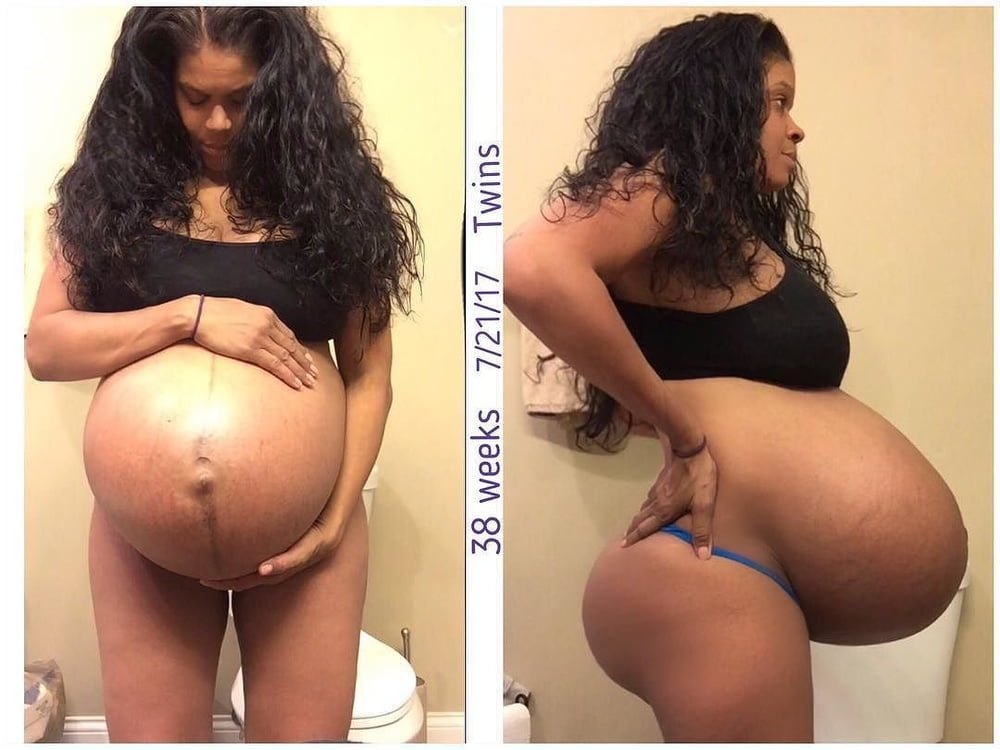
Why am I pooping more than usual?
Of course, there are always exceptions to the rule.
Though frequent bowel movements aren’t a sign of pregnancy, some people might be more prone to diarrhea during early pregnancy.
Keep reading for some possible reasons.
Why do you poop a lot in early pregnancy?
So, those exceptions to the rule? If you already suffer from IBS, for example, there is every chance that getting pregnant may exacerbate existing gastrointestinal issues.
And of course, the two-week wait can come with extra nervousness and stress, which for some people can lead to stomach issues.
Plus, once you get that positive result, the literal “oh sh*t” realization that your world is about to be turned upside-down can be enough to have you running to the toilet.
Is it normal to poop a lot while pregnant?
It’s not common, but it’s also not usually something to worry about.
Constipation and the associated issues like bloating and hemorrhoids are more common digestive issues during pregnancy, due to your growing uterus and changing hormones.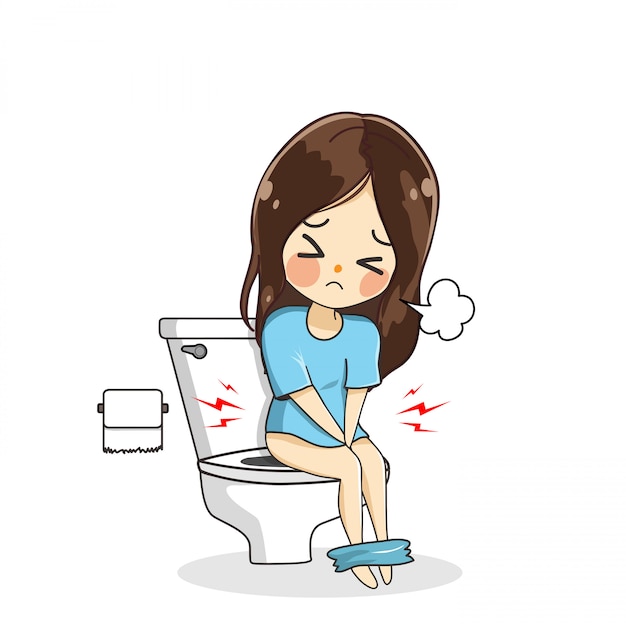
Just before going into labor, some mamas report experiencing frequent loose bowel movements, which is often attributed to a sudden shift in hormones preparing for birth and urging your pelvic floor muscles to relax.
So if you find yourself pooping a lot during pregnancy, is it something to be worried about? Not necessarily.
But if you’re suffering from pregnancy diarrhea frequently, it’s worth having a chat with your doctor.
Especially if you’re losing weight because of it or experiencing painful abdominal cramps or a fever.
Is pooping a lot a sign of period?
So if getting pregnant and pooping a lot aren’t necessarily linked, can it be a sign of your period? It sure can be, yes.
Sorry if that’s not the news you were hoping for.
Research has found 34% of women report experiencing gastrointestinal issues, including diarrhea, during their period.
Those pesky period poops sure can be uncomfortable.
There’s only one way to know if you’re pregnant or not, mama, and that’s with a pregnancy test. Best of luck!
Best of luck!
💡 More from The 411:
Can You Take Colace While Pregnant?
40 Fertility Foods & The Science Behind Them
How to Get Pregnant: Expert Advice From Fertility Specialists
19 Fertility Acronyms & Abbreviations You Need to Know
Can You Get Pregnant Right Before Your Period?
How Long Does it Take to Get Pregnant After Sex?
Can a Fertility App Really Help Me?
Fertility Meditation: Everything You Need to Know
9 Ways to Boost Your Fertility Naturally
4 Fertility Hormones Every TTC Woman Should Know
TTC Meaning: The Language of Trying to Conceive
Fertility Diet: Tips, Tricks, and Busting Myths
How Long Does It Take to Get Pregnant?
How Soon After Unprotected Sex Can I Test for Pregnancy?
Watery Period Blood: A Sign of Pregnancy?
First signs of pregnancy before delay, early symptoms
Significant hormonal changes occur during pregnancy. This causes a number of symptoms. Some women experience pregnancy symptoms right away, while others may only have a few. About the first signs of pregnancy at an early stage and when exactly the initial signs of pregnancy appear are described in the article.
About the first signs of pregnancy at an early stage and when exactly the initial signs of pregnancy appear are described in the article.
At what time do the first signs of pregnancy appear
The answer to the question when the first signs of pregnancy appear is quite ambiguous, because some women do not feel any signs at all during the first few weeks. At what week do the first signs of pregnancy appear in others? When do the first signs of pregnancy appear after conception? Symptoms of very early pregnancy (such as breast tenderness) may appear before a missed period, as early as six to seven days after conception, while other early signs of pregnancy (such as spotting) may appear about a week after ovulation. We will tell you more about the first signs of pregnancy before menstruation and when the signs of pregnancy appear.
What are the earliest signs of pregnancy?
The first signs of pregnancy in the early stages:
- delayed menstruation - 29%;
- nausea - 25%;
- mood swings - from 14 to 23%;
- breast changes - 17%;
- pain in the lower abdomen - 15%;
- depression - 15%;
- fatigue, drowsiness - 13%
- decrease in immunity - 6%;
- the first signs of pregnancy - discharge or implantation bleeding - only 3%.
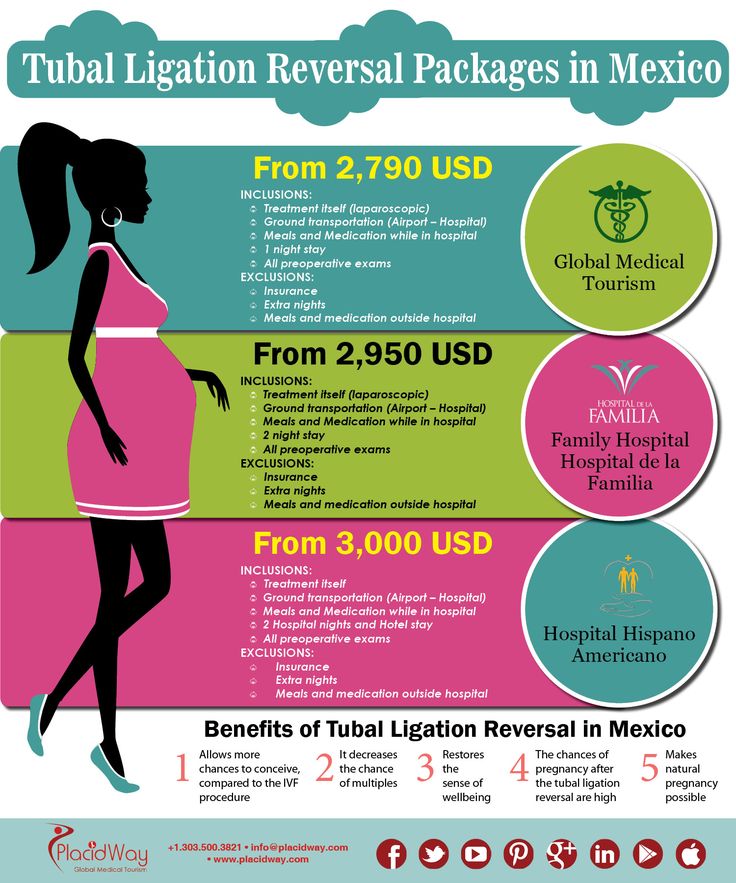
Physiological first signs of pregnancy
What are the very first symptoms of pregnancy?
The most common physiological signs of pregnancy include:
- Tender and enlarged breasts. Signs of pregnancy in the first days after conception include breast changes (1-2 weeks after conception). The area around the nipples, called the areola, may also darken.
- Drowsiness and fatigue. Fatigue is also among the signs of pregnancy in the first days after conception. During early pregnancy, levels of the hormone progesterone rise dramatically, which can cause drowsiness.
- Nausea with vomiting. When do these signs of pregnancy appear? Morning sickness, which can appear at any time of the day or night, often appears between the second and eighth weeks after conception.
- Dizziness and fainting .
 This may be due to dilation of blood vessels, lowering blood pressure and blood sugar levels.
This may be due to dilation of blood vessels, lowering blood pressure and blood sugar levels.
- Spasms. Some women experience symptoms of pregnancy in the early days, such as mild uterine cramps.
- Headaches and back pains. Many pregnant women complain of frequent headaches, while others experience back pain.
- Insomnia - another first sign of pregnancy before the test. Causes can include stress, physical discomfort, and hormonal changes.
- Change in taste preferences. Like most other symptoms of pregnancy, these eating habits can be attributed to hormonal changes.
- Temperature. Early signs of pregnancy include fever (37-37.5).
- Delayed menstruation. How long does it take for the first signs of pregnancy to appear? If you are of childbearing age and a week or more has passed without your expected period, you may be pregnant.
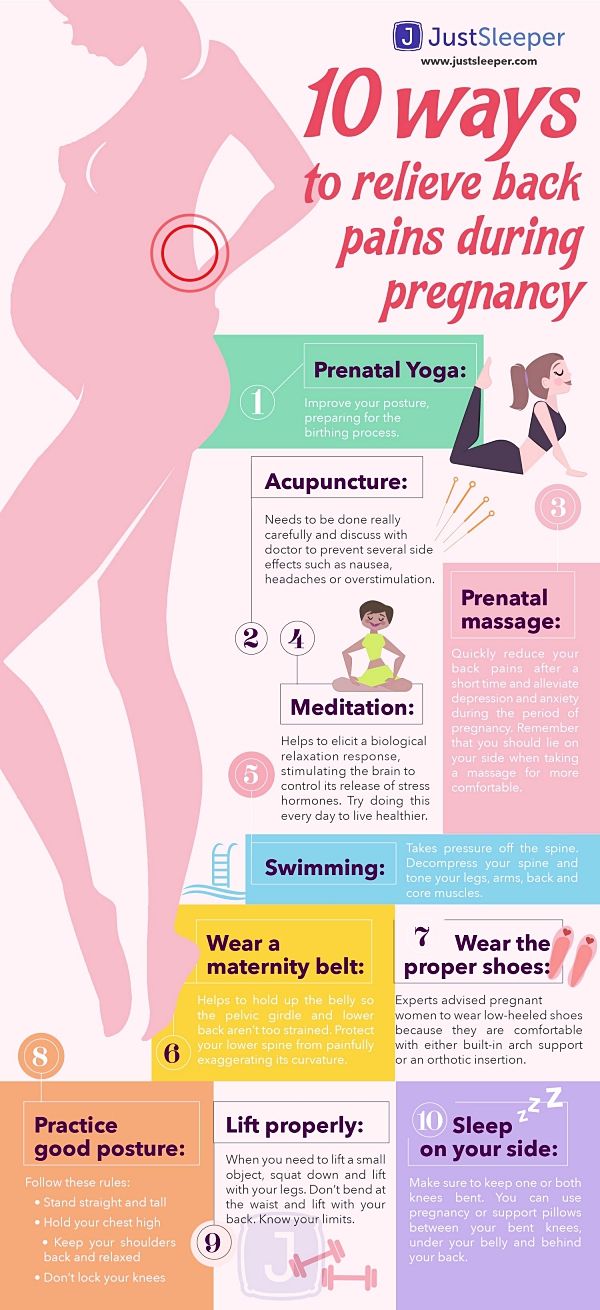 However, this symptom can be misleading if you have an irregular menstrual cycle.
However, this symptom can be misleading if you have an irregular menstrual cycle.
- Bloody discharge - the first signs of pregnancy . This bleeding, known as implantation bleeding, occurs when a fertilized egg attaches to the lining of the uterus, approximately 10 to 14 days after conception.
- Bloating, heartburn. Hormonal changes can cause problems with the stomach and esophagus - these are common signs of pregnancy at 2 weeks.
- Constipation . Hormonal changes cause the digestive system to slow down, which can lead to constipation (signs of pregnancy after a delay).
- Frequent urination. You may urinate more than usual, which is a common sign of pregnancy at 5 weeks. During pregnancy, the amount of blood in the body increases, causing the kidneys to process excess fluid that enters the bladder.
- Runny nose.
 The appearance of this symptom is associated with excessive production of the hormone estrogen.
The appearance of this symptom is associated with excessive production of the hormone estrogen.
- Exacerbation of chronic diseases. This is a sign of pregnancy after ovulation.
- Increased salivation. Also associated with hormonal changes.
- Sense of smell enhancement . Signs of pregnancy in the first two weeks may cause sensitivity to certain smells and the sense of taste may change.
Emotional first signs of pregnancy
The first signs of pregnancy before the delay (the earliest signs of pregnancy) include psycho-emotional symptoms.
- Mood swings.
- Irritability.
- Vulnerability, tearfulness.
- Capriciousness.
- Depression.
These are all emotional signs of early pregnancy that many women report. They describe feelings of heightened emotion or even bouts of crying, which are associated with rapid changes in hormone levels in the body. Also, signs of pregnancy at week 4 can make you feel PMS-style cranky. In addition, about 15% of women suffer from depression or anxiety during pregnancy. And after childbirth, these conditions suffer even more. In this case, it is better to seek help from a doctor.
Also, signs of pregnancy at week 4 can make you feel PMS-style cranky. In addition, about 15% of women suffer from depression or anxiety during pregnancy. And after childbirth, these conditions suffer even more. In this case, it is better to seek help from a doctor.
Do everything you can to improve your mood: get plenty of rest, eat well, get enough sleep, do things you love, and pamper yourself.
However, be aware that mood swings can be caused by a number of conditions other than pregnancy.
Influence of early pregnancy on daily routine
Early signs of pregnancy, mainly those that bring discomfort, can cause a change in daily routine. Here are some tips on what you can do with some of them:
- In case of toxicosis, avoid too hot or too cold food - this provokes an attack of vomiting. Eat often - at least 5-6 times a day, but in small portions.
- For nausea or vomiting, try ginger, chamomile, or vitamin B6.
- Drink plenty of water, in small sips between meals, to replenish lost fluids.
 Teas, juices, fruit drinks are also suitable.
Teas, juices, fruit drinks are also suitable. - For back pain, wear shoes or shoe insoles designed for pregnant women and avoid high heels. Sleep on a firm mattress.
- For chest discomfort, wear a special bra that supports enlarged breasts.
- For constipation, eat more fiber-rich foods such as wheat bran and fresh vegetables and fruits.
- If you suffer from headaches and mood swings, try stress reduction techniques such as yoga or meditation.
- Be outdoors more often, at least half an hour a day. This helps to reduce the symptoms of toxicosis, calm the nervous system.
- Maintain your daily physical activity for as long as it is convenient for you to perform certain activities.
- Eat a balanced diet with enough proteins, fats and carbohydrates.
Important! All these tips are advisory in nature, be sure to consult your doctor if you encounter discomfort.
What to do if you notice early signs of pregnancy
To make sure the signs of pregnancy are accurate, you can use the following methods to diagnose early pregnancy:
- Donate blood for hCG.
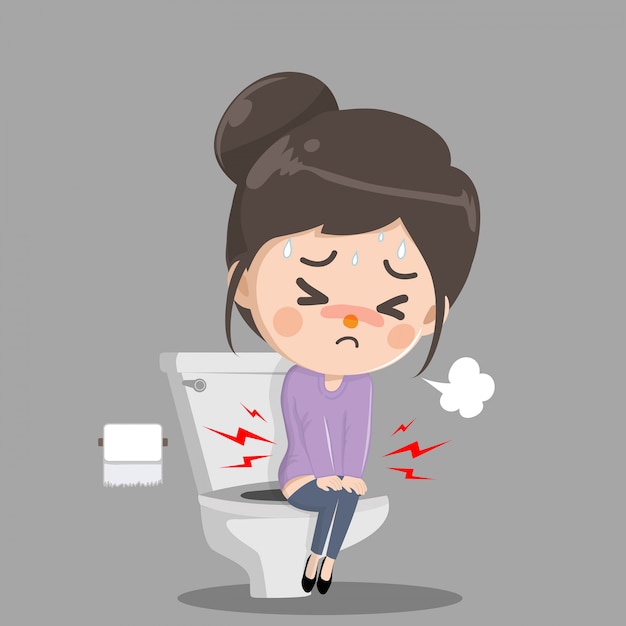 This method can be used a few days after conception. This type of pregnancy test is done using a small sample of blood that is analyzed in a hospital. It determines whether there is a pregnancy hormone in your body and in what quantity. Its accuracy is 99%.
This method can be used a few days after conception. This type of pregnancy test is done using a small sample of blood that is analyzed in a hospital. It determines whether there is a pregnancy hormone in your body and in what quantity. Its accuracy is 99%. - Use a test strip. It can be used at home from the first days of delay. To determine pregnancy, dip the reagent area of the test strip into the urine. Accuracy: 99%. You can buy Evitest or HomeTest test strips in our pharmacy.
- Use jet or electronic test. They can be used at home a few days before your expected period. You need to remove its protective cap, substitute the test under the stream of urine for 10 seconds, and after 3-5 minutes get the result. Accuracy: 97%. In our pharmacy you can buy Evitest or Alpe inkjet tests.
- Get your first ultrasound. You can use this method at 3-4 weeks from the start of a missed period.
 At this time, ultrasound will show the very fact of uterine pregnancy, and the place of attachment of the fetal egg is also determined. Accuracy: 100%.
At this time, ultrasound will show the very fact of uterine pregnancy, and the place of attachment of the fetal egg is also determined. Accuracy: 100%.
Help Doc.ua: you can make an appointment with a gynecologist on the website.
FIRST SIGNS OF PREGNANCY
All girls have heard about the first signs of pregnancy, the so-called discharge .
How else can you tell if you are pregnant or not? Let's say you had a long delay in your menstrual cycle. Time flies, and menstrual bleeding does not start. In this case, you will systematically feel nausea, while the mammary glands will seem heavy to you.
In addition to discharge, another sign of pregnancy is the constant thirst for sleep. The everyday activities of the people around you are annoying, and besides, you become very nervous about the presence of certain smells.
In addition to discharge, the first sign of pregnancy is an increase in appetite. Food begins to evaporate from your refrigerator at an astonishing rate and in a variety of combinations of ingredients. At the same time, saliva may still flow, and the number of midnight trips to the toilet will also increase. During the day, you can’t walk for a long time either, this is problematic because of the constant desire to urinate.
At the same time, saliva may still flow, and the number of midnight trips to the toilet will also increase. During the day, you can’t walk for a long time either, this is problematic because of the constant desire to urinate.
All of these discharges and other signs may be present both together and separately. Often a woman talks about a delay in the menstrual cycle in the absence of any deviations in her state of health.
There is an accessible and easy way to clarify these facts. Of course, no method will give you 100% guarantees. You can get a reliable 100% conclusion only after an examination by a gynecologist and a special diagnosis (examination). However, when the first signs of pregnancy appear (discharge, etc.) in the initial 10-12 days of the deviation of the menstrual cycle from the chronology, even in a good clinic you will not be able to guarantee the results of studies to determine pregnancy.
If menstruation does not start at the expected time, then after waiting for the morning, measure the body temperature in the rectum.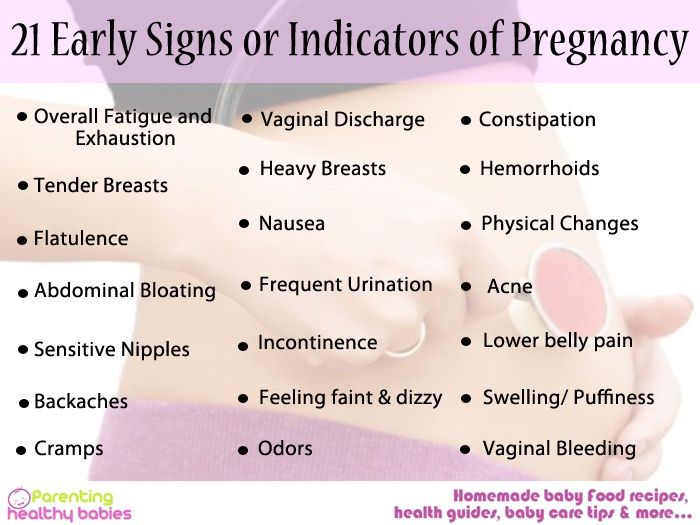 An ordinary thermometer (medical, of course) is inserted into the rectum as soon as you wake up. Do not get out of bed while performing this operation. Doctors advise to prepare a thermometer in the evening and put it near the bed.
An ordinary thermometer (medical, of course) is inserted into the rectum as soon as you wake up. Do not get out of bed while performing this operation. Doctors advise to prepare a thermometer in the evening and put it near the bed.
Need more than 6 hours of sleep. The thermometer is inserted behind the muscle that compresses the anus. The insertion depth of the thermometer is 2 centimeters, and the measurement time is from five to seven minutes. Record the measurement results. Measure body temperature every day for 7-10 days. If the temperature is most often more than 37 C, then this indicates the presence of the first signs of pregnancy.
In the absence of menstruation for 3 or more days, as well as in the presence of the first signs of pregnancy (discharge), gynecologists recommend doing a test to determine early pregnancy (most of the tests that are commercially available detect the presence of pregnancy already on the 1st day of delay !). They are easy to use and quite reliable.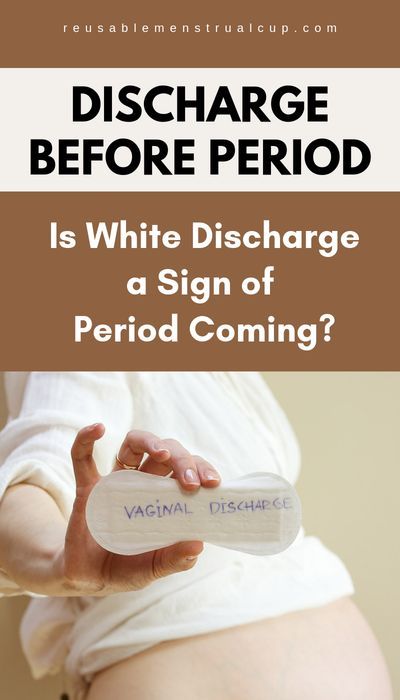
The confidence probability of the test turns out to be much higher if it is carried out two or three times.
Outwardly, these tests are all different, but they are based on one chemical reaction to a specific hormone called human chorionic gonadotropin. This hormone is produced during pregnancy. The breakdown products of the hormone are excreted in the urine. The chemical reagent that drinks the dough plate interacts with these products.
Check that the test has not expired. For the experiment, the purpose of which are the first signs of pregnancy (discharge, etc.) it is better to use morning urine. After sleep, the content of the hormone and its decay products in the female body increases. This means that the probability that the tester will detect this increases. If you are a person who does not trust such tests, then as an option you can do a urine test to quantify the content of hCG. Although, this analysis is carried out by far not every medical and diagnostic center.
Let's say 3-4 weeks have passed, the temperature in the rectum is systematically over 37 degrees, and the test for determining signs of pregnancy gave a positive result 2 times. At the same time, you feel great, there are no subjective disorders and you are full of energy. There may even be an emotional upsurge. Do you need a women's consultation to determine the first signs of pregnancy? Need. To begin with, to confirm that the pregnancy is uterine, and also that the fetal egg was formed precisely in the uterine cavity.
In the normal course of pregnancy, fertilization occurs in the uterine cavity itself. After all, a fertilized egg must reach the site of implantation (through the fallopian tube). If there are any obstacles in the way of the fetal egg (narrowing in the fallopian tube or in the tubal angle of the uterus), and also if the fertilized egg moves for a very long time, or the egg is too large to pass the fallopian tube, then such an egg will not enter the uterine cavity.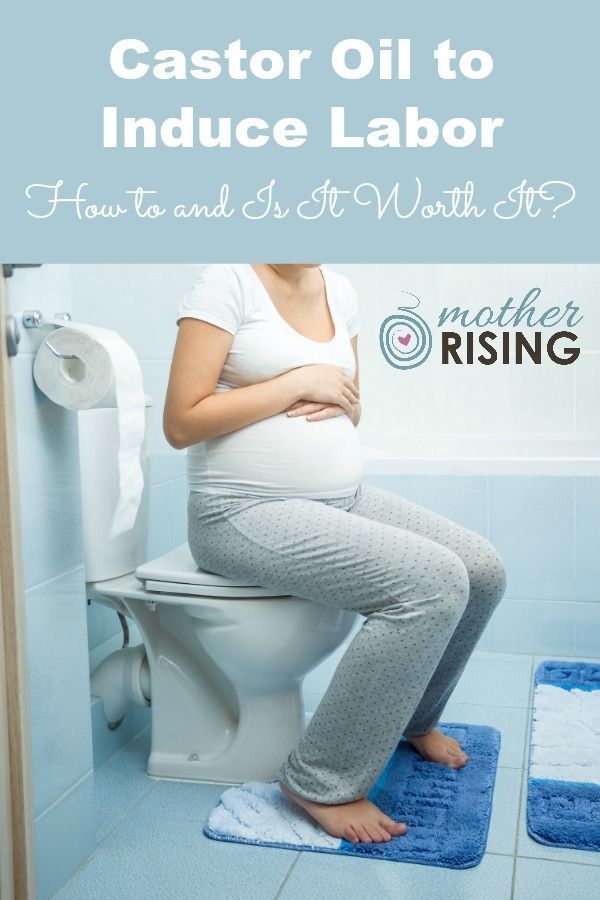
In this case, an ectopic or ectopic pregnancy may occur and develop. Remember that an ectopic pregnancy in the earliest period shows the same qualitative reactions as the uterine one. In general, the first signs of pregnancy, discharge for example, are universal for pregnancy in the general case.
A gynecologist can detect only indirect first signs of pregnancy, such as plethora of the external genitalia, discoloration of the mucous membrane of the cervix and vagina. It turns blue (acquires a cyanotic hue). In addition, softening of the isthmus (the place where the body of the uterus and its cervix connects) may be noted.
In general, the body of the uterus may be quite large and soft, and may also appear asymmetrical due to swelling at the site of implantation of the ovum.
The uterine appendages are palpated (felt) by a gynecologist. Sometimes it happens that during a normally developing pregnancy, growths are found in the places where the appendages of the cervix are projected. These changes are usually reversible and the normal structure of the ovary is gradually restored. Such growths may appear as corpus luteum or corpus luteum cysts. However, these formations can also be pathological.
These changes are usually reversible and the normal structure of the ovary is gradually restored. Such growths may appear as corpus luteum or corpus luteum cysts. However, these formations can also be pathological.
To find out if this is the case, you need to resort to other methods of determining the presence of discharge and other first signs of pregnancy.
Ultrasound of the pelvic organs is the safest method. Depending on which research method is chosen (transvaginal or transabdominal), already three weeks after conception, you can get information about the fact of pregnancy, as well as its localization.
The current level of development of medical equipment and methods allows you to diagnose pregnancy, as well as predict its further development. In addition to ultrasound, the expectant mother can undergo a test examination, which will reveal the likelihood of developing intrauterine pathologies in the baby, the appearance of genetic changes, and the risk of infection of the fetus.